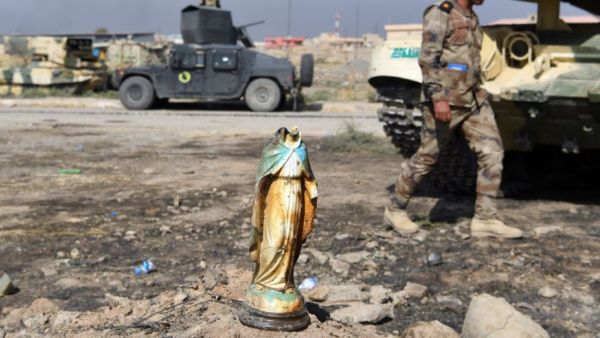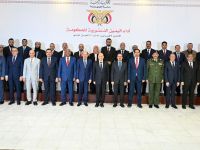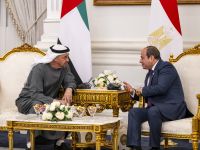For the first time in two years bells can be heard again in the northern Iraqi village of Bartella, pealing from the local church, which unlike many other structures is still standing.
Now located just behind the frontlines of the battle for Mosul, Bartella bears the scars of heavy fighting after the last Daesh extremist fighters were expelled, leaving a scene of devastation behind.
The walls of the Mart Shmuny church are charred, hymn books lie scattered around the building between the dust-covered pews, and only the keyboard remains of its electric organ. The statue of a revered clergyman that once stood in the courtyard is missing, while the daubings of Daesh fighters on an adjacent building show what they thought of the Christians: "Allah stands above the cross."
Armoured vehicles of the Iraqi military now thunder along the narrow village streets, their doors adorned with the insignia of the elite anti-extremist unit that retook Bartella just a couple of days earlier. Trucks ferry in fuel and other supplies needed for the onward assault towards Mosul, their wheels throwing up clouds of dust into the murky grey air, with only a few glimmers of sun.
The drone of jet engines is continuous as warplanes course overhead to the front in support of the operation to drive Daesh from the key city.
Located just a few kilometres away, Bartella is one of a handful of local settlements that were inhabited mainly by Christians and members of the Shabak ethnic and religious minority. Around 8,000 people lived here until August 7, 2014, a date that is seared into the memory of lawyer Maath Hajji Abbas. That's the day the jihadists overran the village, sending the inhabitants fleeing headlong.
"Life in Bartella was easy, we lived peacefully together," remembers Maath, a 28-year-old member of the Shabak community. He is shaken by the spectacle of damage in his village, but also visibly happy that he can walk here again.
When he heard of Bartella's liberation, he immediately made his way from Baghdad to the north. "This is my home," he says after visiting his house for the first time in more than two years. "Most of it is still standing," he says with relief.
But it's too early to think of returning for good. The army only just declared the village liberated, and such reports in war are often premature as frontlines can quickly shift. There were several battles in Bartella and Daesh snipers are still shooting in the area, says an Iraqi soldier sitting by the roadside with a wounded leg.
He is drowned out as a Humvee truck races to a halt and two soldiers wrench open the door and remove another wounded soldier from the vehicle, evacuated straight from the front line.
In many places under their rule, Daesh also dug extensive tunnel networks which militants use to surprise the advancing Iraqi forces.
Thousands of improvised explosive devices and booby traps are hidden in the ground and in buildings. There are several craters where they have exploded on the main road into Bartella, while other devices that were discovered and unearthed lie dumped by the wayside. Elsewhere, red flags warn of mines underfoot, and road users are careful not to drive on the verges.
Despite the danger, Maath still wants to come home as soon as possible. "If the Iraqi army would let me, I would stay now," he says, even though the fighting is still so close. While he has seen that his house is still more or less intact, he dare not enter because of booby traps. Most of all, there are still almost no conditions for normal life such as electricity, shops or security.
It's the same in many of the surrounding villages. If people do return it is only briefly to retrieve what is left of their belongings, like Mahmud Abbas Mahmud, a 50-year-old who just came back with his wife and sons.
They stowed what they could find in their house on the back of a pick-up truck, some mattresses, dirty blankets, a few kitchen units and an old microwave. There's no sign of course of the 100 chickens his wife used to tend.
Mahmud takes out a cell phone and shows the photos he just took of their home. They were less fortunate than Maath, as the entire back wall of the building has collapsed and it is uninhabitable. For Mahmud's family and other families uprooted in 2014, there will be no easy homecoming, even after the last of the explosives and snipers are cleared.
By Jan Kuhlmann








